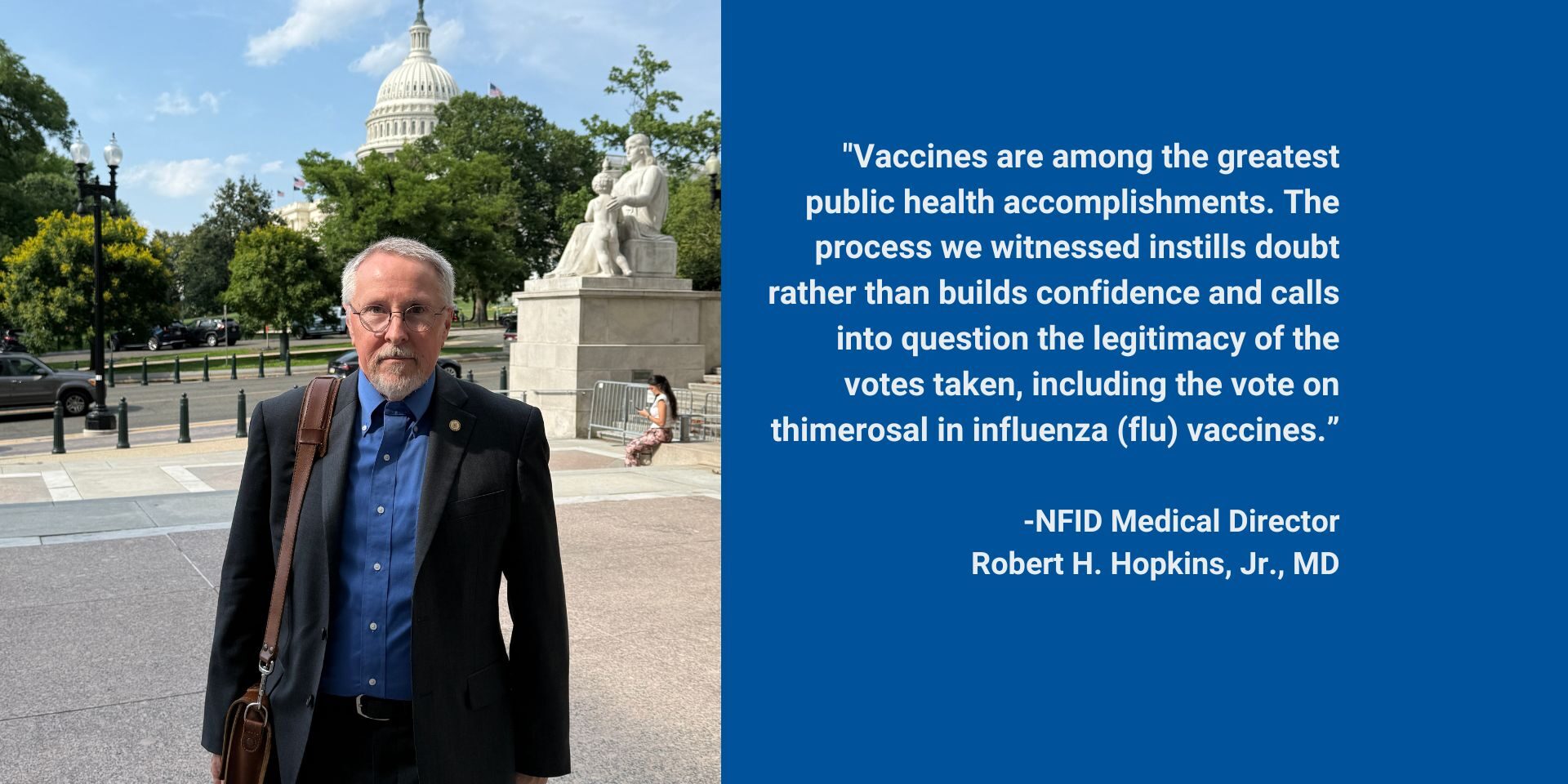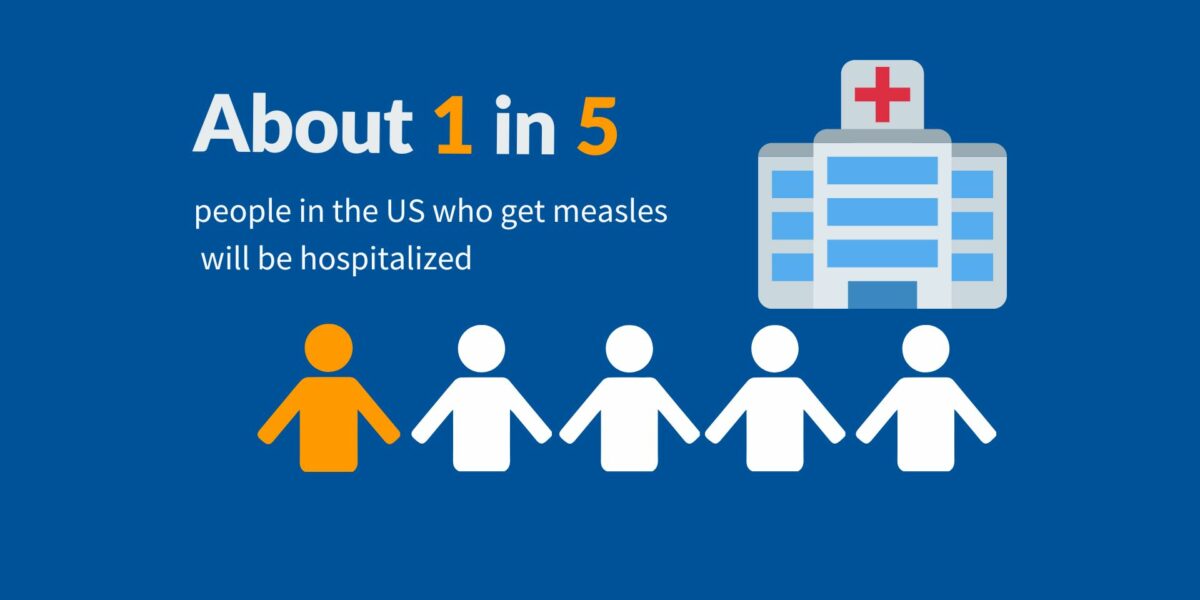
Immunization policy decisions must be guided by science. The National Foundation for Infectious Diseases (NFID) is gravely concerned with the flawed process that occurred during the recent Advisory Committee on Immunization Practices (ACIP) meeting on June 25-26, 2025. Read on for the complete NFID statement and additional insights from partner organizations …
American College of Obstetricians and Gynecologists (ACOG): The meeting of the newly reconstructed ACIP demonstrated that the committee did not follow the longstanding tradition of robust, unbiased review of reputable scientific evidence by medical and public health experts. Particularly concerning was the new committee’s lack of acknowledgement of the presentation of well-established efficacy and safety data on the COVID-19 vaccine, which was abruptly removed from the adult immunization schedule in June, during pregnancy. The data presented by CDC made clear the importance of COVID-19 vaccination for pregnant patients and for their infants. Additionally, ACOG is concerned that the ACIP vote regarding influenza vaccination will hinder a pregnant woman’s ability and decision to receive the seasonal flu vaccine, which has long been proven to be safe during pregnancy and which has provided protection to pregnant women for years. The data presented to ACIP affirm why ACOG continues to recommend safe, effective maternal vaccination. If ACIP responded to the data as presented in a way that values medical evidence and public health, the government’s recommendation for COVID-19 vaccination during pregnancy would be restored and support for maternal vaccination would be unwavering.
—ACOG President, Steven J. Fleischman, MD, MBA
American College of Physicians (ACP): ACP is deeply alarmed by the proceedings of the ACIP meeting this week. What should have been a rigorous, evidence-based discussion on the national vaccine schedule instead appeared to be a predetermined exercise orchestrated to undermine the well-established safety and efficacy of vaccines and fundamental basics of science. Our concerns have been confirmed: a committee and process that was once grounded in science and the best available evidence has become politicized. The committee—assembled hastily and without transparency and not chaired by a physician with medical training—demonstrated bias and made statements that go against the evidence-to-recommendation framework and transparent process for which the previous ACIP was known and trusted. False comments about vaccine safety made by current committee members with no clinical experience will further sow seeds of fear, doubt, and distrust in medicine among patients and contribute to the spread of medical mis- and disinformation. This is a dangerous and reckless path that will leave our patients vulnerable to preventable illnesses. With this erosion of trust, physicians and the public will be forced to seek scientifically sound vaccine guidance and recommendations that are based on the best available evidence to protect the public health in our country elsewhere.
—ACP President, Jason M. Goldman, MD
Infectious Diseases Society of America (IDSA): The June meeting of the ACIP was politicized, chaotic, and not transparent. That kind of process is harmful to the American people. Agenda items were added last minute, limiting the ability of members to review data. Disclosures about potential conflicts of interest of the newly appointed ACIP members have not been made public. Re-examining the childhood vaccine schedule and the use of thimerosal are both politically motivated actions that are not based on science. Raising questions without adequate data casts doubt on vaccination, which can further drive down confidence in vaccines. More than any other medications, vaccines are extensively and constantly reviewed and evaluated. Vaccination saves lives. The American people deserve an objective and transparent review process based on scientific evidence, not political agendas with no basis in facts.
—Tina Tan, MD, President, IDSA
National Foundation for Infectious Diseases (NFID): Deviation from the long-standing evidence-based process that has historically guided ACIP deliberations undermines transparency and trust, risks legitimizing misinformation, and is harmful to public health. A process that includes input from Centers for Disease Control and Prevention (CDC) experts, working groups, and trusted scientific and medical organizations, has been critical to ensuring rigorous, transparent, evidence-based recommendations that the public and healthcare professionals can trust. Voting on critical policy recommendations without due process that includes a thorough, balanced, and vetted review of available data by qualified experts invalidates the results and leads to confusion and distrust of recommendations. “Vaccines are among the greatest public health accomplishments,” said NFID Medical Director Robert H. Hopkins, Jr., MD. “The process we witnessed instills doubt rather than builds confidence and calls into question the legitimacy of the votes taken, including the vote on thimerosal in influenza (flu) vaccines.”
There is no new scientific evidence warranting a change in recommendations for thimerosal-containing flu vaccines. Thimerosal has been used for decades in the US as a preservative to prevent the growth of dangerous germs. Based on multiple peer-reviewed scientific studies in the US and other countries, the US Food and Drug Administration (FDA) concluded that thimerosal-containing vaccines are safe and have a long history of preventing contamination. The virtually non-existent risks of thimerosal in flu vaccines pale in comparison to the real risks posed by flu each year in the US. There were 250 US pediatric flu deaths during the 2024-2025 season, the deadliest non-pandemic flu season on record for US children. Flu vaccination saves lives and helps prevent serious flu-related complications. CDC preliminary estimates show that during the 2024-2025 season, flu vaccination prevented 12.5 million flu-related illnesses, 5.7 million medical visits, and 240,000 hospitalizations. Any changes in immunization recommendations, including recommendations on COVID-19 vaccines, maternal and pediatric RSV immunization, and the use of thimerosal in flu vaccines, must be based on science and evaluated using a consistent and rigorous process. Immunization is an essential tool in protecting against serious outcomes of preventable diseases. NFID strongly supports the use of evidence-based guidance reviewed by qualified experts, within CDC and externally, to inform public health policy, and we will work to preserve equitable access, choice, and public and private insurance coverage to life-saving immunizations to protect the health of people across the US.
National Association of Pediatric Nurse Practitioners (NAPNAP): Since 2004, NAPNAP has had a member expert serve as a voting or liaison member of ACIP. NAPNAP appreciates the thoughtful comments and scientific insights shared by CDC staff presenters and organizational liaisons, but we are, for the first time in more than two decades of ACIP participation, compelled to question the validity and reliability of the ACIP review and voting process. As we look to the future, NAPNAP will collaborate with organizations such as the American Academy of Pediatrics, NFID, and others that support immunization recommendations based on rigorous analysis of widely accepted scientific evidence and thoughtful discussion of first-hand clinical experience. We will join forces to urge insurance companies to stand up for science and public health to provide immunization coverage to infants, children, adolescents, and families. We implore the US Senate to approve a CDC director who has significant scientific or medical experience, understands and adheres to long-standing agency protocols, values the experience of the agency’s subject matter experts and staff, and will mandate the use of widely accepted scientific research and evidence in decision-making. Children and families deserve no less.
Pediatric Infectious Diseases Society (PIDS): ACIP is intended to provide “expert advice” on federal immunization policy. That is how the committee operated prior to the extraordinary firings of the 17 vetted, respected, and knowledgeable clinicians, researchers, immunologists, and public health leaders then on ACIP. The new and hastily appointed 7-member committee that replaced those experts conducted its first meeting, and the fears shared by PIDS and many in the scientific community of a politicized ACIP materialized over the past few days. In a meeting designed to undermine public trust in the safety and efficacy of many vaccines, data were misrepresented, unproven and disproven statements were presented as facts, and anti-vaccine framing dominated discussions of COVID-19, influenza, RSV, hepatitis B, MMRV, and the childhood vaccine schedule. Absent the regular evidence-based review of the science relating to these vaccines, led and conducted by experts in the field, Americans will lose faith in ACIP’s legitimacy. The most severe resulting consequences of undermined public trust in vaccines will disproportionately fall on those who are most vulnerable to preventable diseases. PIDS remains steadfast in our belief in the safety and efficacy of vaccines in protecting children, the necessity of the childhood vaccine schedule and the Vaccines for Children Program to ensure no child is forced to suffer from a preventable disease. PIDS will continue to work with partners to preserve vaccine recommendations based on evidence, not politics. (PIDS President William J. Steinback, MD, subsequently shared a letter with his reflections on the ACIP meeting)
Society of Infectious Diseases Pharmacists (SIDP): The recent overhaul of ACIP membership has sparked significant concerns, not only about the integrity of the US public health infrastructure, but also about the potential erosion of public trust in immunization programs. SIDP is taking action to ensure that national vaccine recommendations and immunization practices are preserved. We believe we must do what we can to educate key decision makers and the public that the rigorous review process for recommendations must continue to be grounded in scientific evidence. To achieve this goal, we will be advocating for the good of the public’s health by working closely with other organizations to help reduce disease outbreaks, protect vulnerable populations, and promote community-wide immunity. Our efforts will focus on upholding, sharing, and developing credible and essential sources of science-based guidelines to help pharmacists and other medical professionals, parents, and all patients make informed immunization decisions. We will be voicing our support for the appointment of qualified medical and scientific professionals with credentials that reinforce public confidence in immunization programs, and we have active representatives serving on work groups. We are also empowering our members to engage with their legislators and state health departments to drive meaningful change. Together we will work to restore the breadth of expertise necessary to make safe and effective recommendations for immunization practice with qualified experts in infectious diseases.
—SIDP President Erin K. McCreary, PharmD, BCIDP
Vaccinate Your Family (VYF): For more than 6 decades, ACIP has provided evidence-based recommendations that have guided healthcare providers in protecting public health. Traditionally composed of trusted experts in immunology, epidemiology, pediatrics, geriatrics, internal medicine, infectious disease, and public health, ACIP has long been a cornerstone of sound vaccine policy. However, following the June 25–26, 2025 meeting—the first since the Secretary of Health replaced all 17 vetted voting members with newly appointed individuals—VYF has serious concerns. With the exception of Cody Meissner, MD, the conduct and qualifications of the newly seated members raised significant questions about the integrity of future vaccine recommendations. America’s current measles surge and eroding childhood vaccination rates underscore why it is dangerous to allow the members of this committee to spend government resources to revisit well-established vaccine science and guidance. The misinformation that was presented regarding the safety of thimerosal, the recommended childhood vaccine schedule, and COVID-19 protection for pregnant women, only risks lending credibility to the biased notions of many of the committee members. VYF is particularly concerned about the low standard of the evidence presented before the committee prior to their vote on thimerosal-containing flu vaccines. The committee voted on a recommendation change after hearing only 1 presentation from an independent citizen, abandoning the scientific rigor we have come to expect from this committee. Typically, recommendations are voted on after hearing data presented from multiple sources and the use of the Evidence to Recommendations (EtR) framework. According to the CDC website, “the purpose of the EtR framework is to describe information for consideration in making recommendations move from evidence to decisions, and to provide transparency around the impact of these factors on deliberations when considering a recommendation.” Our concern is not that the committee wishes to move away from the use of thimerosal-containing flu vaccines, but rather the inadequate standard of evidence used to support this decision and the complete omission of the extensive body of research demonstrating thimerosal’s safety. This departure from scientific rigor sets a dangerous precedent.
The low bar of evidence upon which the committee made recommendations could have serious consequences, especially if it is extended to the future review of the childhood immunization schedule as they have indicated is their plan. ACIP recommendations set the foundation for vaccine coverage under public and private insurance and the Vaccines for Children (VFC) program; the recommendations of this committee directly impact vaccine access and affordability and must be made with a higher level of scientific rigor than was demonstrated during the June meeting.
Voices for Vaccines: Historically, ACIP is an independent panel of vaccine specialists that meets at the Centers for Disease Control and Prevention (CDC). After the FDA licenses a vaccine, ACIP evaluates clinical-trial findings, post-marketing surveillance, and disease-burden data, then votes on how and for whom the product should be used. Its recommendations shape the US immunization schedule that physicians, pharmacists, insurers, and public health programs use to determine who gets vaccines and when they get them. In the past, 17 voting members, including pediatricians, infectious disease scientists, and infectious-disease physicians, with 1 seat reserved for a consumer representative, were selected through an open Department of Health and Human Services process. They filed financial disclosures each year and recused themselves from decisions where they had conflicts of interest.
To share additional organizational statements, please share a link via email to: communications@nfid.org.
To join the conversation and get the latest news on infectious diseases:
- Like and follow NFID on social media
- Listen and subscribe to the Infectious IDeas podcast
- Subscribe to receive future NFID Updates
Related Posts

5 Reasons Why Vaccines Are Good for Your Heart
For people with heart disease, getting vaccinated is as important to staying healthy as diet and exercise

News Round-Up: Vaccines, Measles, Flu, and COVID-19
News and expert insights on COVID-19, influenza, measles, outbreak preparedness, and vaccine policy—including growing concerns about data gaps, divergent immunization recommendations, and the real-world consequences for public health

Welcome to Immunization in 2026: Why Evidence-Based Policy Matters More Than Ever
NFID Medical Director Robert H. Hopkins, Jr., MD, examines the challenges—and stakes—facing the immunization community in the year ahead.
